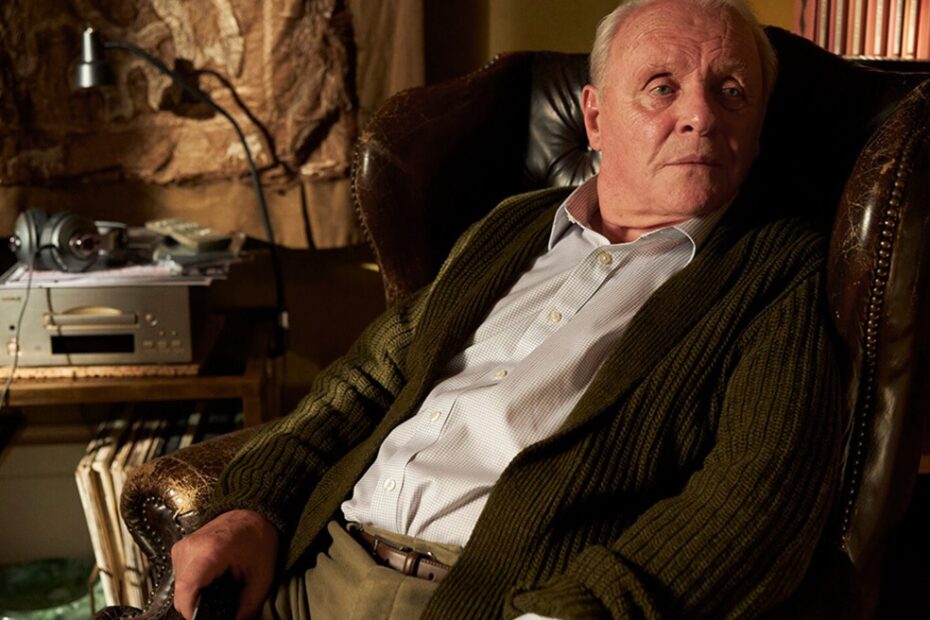An acclaimed piece of cinematic writing, The Father comprises a star-studded cast giving one of their finest performances yet, in a heartbreakingly poignant tale. It follows the tale of a father and a daughter, the father suffering from dementia and the daughter, at her wit’s end on how to continue to take care of her father amid her turbulent personal life. Claiming an Academy award for best actor for his role in this movie, the stoic, headstrong father, Anthony is aptly portrayed by Sir Anthony Hopkins, while the daughter, Anne is played by academy award winning Olivia Coleman.
The story follows a nonlinear timeline as it traces the events leading up to the final climactic moment. The screenwriting is brilliant in a manner that the viewer is placed inside Anthony’s mind. As characters morph into one another, as actors replace the other and there is constant shifting between what we perceive as Anthony’s apartment and Anne’s apartment, we are always left to second guess our answers. As situations change from one to another it is hard to decipher a chronological pattern yet there are subtle ingenious hints such as the parking lot from the window, or the colour of the grocery bags, or the chicken that keeps appearing in several scenes. It is a brilliant portrayal of the confusion within the mind of a patient suffering from dementia as the viewer himself is made to feel it along with him. The reactions of anger and denial of Anthony, the outbursts of violence which are more common but also the lingering moments of helplessness and pain that are brought to life so painstakingly real by Sir Anthony Hopkins adds another dimension to this cinematic piece. The confusion and the pain as he grapples with his reality is mirrored within the audience as they struggle alongside him.
However, the ailing father is not someone that garners straightforward sympathy from the audience. Stoic, strong but also critical and sometimes unnecessarily cruel to his daughter, he gives the aura of someone who was quite successful prominent and a force of nature. From the upscale apartment building to his furniture and music the character is subtlety built up to represent a larger-than-life figure whose very personality is crumbling down in front of our eyes, diminished to a senile, helpless patriarch trying to hold on to his last visages of reality.
This movie offers not only a glimpse into the patient and the disease but also the perspective of the caregiver. We see Anne, a middle-aged woman who struggles with her own personal life while trying to manage the many eccentricities of her father. In her we see profound love and warmth that she has for her father which overcomes the exasperation when dealing with his incremental deterioration of memory. Here we see the dynamics of a child- parent relationship, where the father is lost in reminiscence of a favorite daughter, Lucy while constantly critiquing and comparing Anne with her, whereas Anne despite her mixed feelings about her father is constantly looking for his approval and validation. The movie takes a darker turn when we see how deep her resent can go when she briefly imagines herself throttling her father in his sleep. We see her heartbreak and emotional turmoil as she is faced with the impossible question of whether to leave him in a nursing home as she sets flight to Paris in pursuit of her own dreams and love. We see her anguish when coming to this decision and the need for his approval, some sort of validation that it was okay to do so, that he agrees that he should be better off in a nursing home. Despite these turbulent emotions within the relationship, we see the deep love and connection she shared with her father, which is somehow contrasted by her partner’s feelings of the situation.
In particular there is one scene where the father is slapped by Anne’s husband, and verbally attacked. There is resentment to the life of peace and freedom lost by being the caretaker of his wife’s father, there is deep rooted anger and there is lashing out which is physical and verbal towards the father. Even as this portrays a very darker version of disease and its impact, it is quite interesting how the many aspects and many dynamics are brought to screen quite skillfully by the filmmakers.
As we reach the climatic ending of this extraordinary piece of cinema, we are brought to a heartbreaking halt as we witness an intense and powerful scene of raw emotion. We see Anthony, who has always been headstrong and a force of nature, full of quirks and quips, who always maintained control, giving up that control, succumbing to the inevitabilities of disease. As we witness this incremental progression of this disease there is one poignant line that hits straight to the heart, which in four words encapsulates the ultimate loss of self, “Who exactly am I?”.
As a calm and compassionate member of the nursing staff take over his care and manages to calm Anthony down, we cannot help but feel the pain and fear of this moment that we are forced to encounter, a total loss of one’s perception of time and self, a lifetime of experiences, memories and relationships taken over by a disease, and the diminishing of his character to a little child in distress, calling for his mother. And as we traveled along a journey exploring a labyrinth of emotions and disjointed memories of Anthony, it is all set free in that one concluding line which says everything yet nothing, explores loss yet also acceptance and is acting at its finest, where he states. “I feel as if I’m losing all my leaves. The branches and the wind and the rain. I don’t know what’s happening anymore.”
